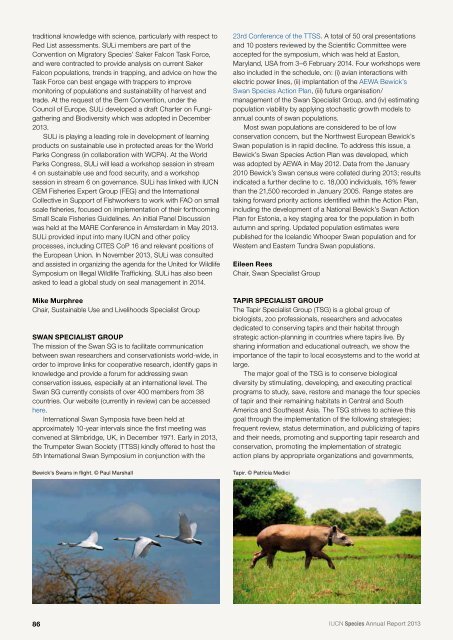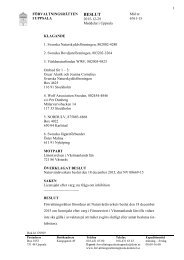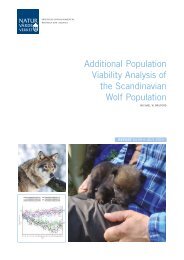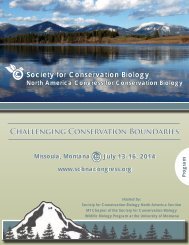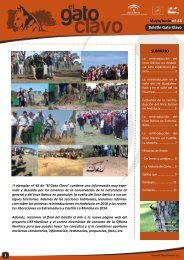1oC3Dbk
1oC3Dbk
1oC3Dbk
Create successful ePaper yourself
Turn your PDF publications into a flip-book with our unique Google optimized e-Paper software.
traditional knowledge with science, particularly with respect to<br />
Red List assessments. SULi members are part of the<br />
Convention on Migratory Species’ Saker Falcon Task Force,<br />
and were contracted to provide analysis on current Saker<br />
Falcon populations, trends in trapping, and advice on how the<br />
Task Force can best engage with trappers to improve<br />
monitoring of populations and sustainability of harvest and<br />
trade. At the request of the Bern Convention, under the<br />
Council of Europe, SULi developed a draft Charter on Fungigathering<br />
and Biodiversity which was adopted in December<br />
2013.<br />
SULi is playing a leading role in development of learning<br />
products on sustainable use in protected areas for the World<br />
Parks Congress (in collaboration with WCPA). At the World<br />
Parks Congress, SULi will lead a workshop session in stream<br />
4 on sustainable use and food security, and a workshop<br />
session in stream 6 on governance. SULi has linked with IUCN<br />
CEM Fisheries Expert Group (FEG) and the International<br />
Collective in Support of Fishworkers to work with FAO on small<br />
scale fisheries, focused on implementation of their forthcoming<br />
Small Scale Fisheries Guidelines. An initial Panel Discussion<br />
was held at the MARE Conference in Amsterdam in May 2013.<br />
SULi provided input into many IUCN and other policy<br />
processes, including CITES CoP 16 and relevant positions of<br />
the European Union. In November 2013, SULi was consulted<br />
and assisted in organizing the agenda for the United for Wildlife<br />
Symposium on Illegal Wildlife Trafficking. SULi has also been<br />
asked to lead a global study on seal management in 2014.<br />
Mike Murphree<br />
Chair, Sustainable Use and Livelihoods Specialist Group<br />
Swan Specialist Group<br />
The mission of the Swan SG is to facilitate communication<br />
between swan researchers and conservationists world-wide, in<br />
order to improve links for cooperative research, identify gaps in<br />
knowledge and provide a forum for addressing swan<br />
conservation issues, especially at an international level. The<br />
Swan SG currently consists of over 400 members from 38<br />
countries. Our website (currently in review) can be accessed<br />
here.<br />
International Swan Symposia have been held at<br />
approximately 10-year intervals since the first meeting was<br />
convened at Slimbridge, UK, in December 1971. Early in 2013,<br />
the Trumpeter Swan Society (TTSS) kindly offered to host the<br />
5th International Swan Symposium in conjunction with the<br />
Bewick’s Swans in flight. © Paul Marshall<br />
23rd Conference of the TTSS. A total of 50 oral presentations<br />
and 10 posters reviewed by the Scientific Committee were<br />
accepted for the symposium, which was held at Easton,<br />
Maryland, USA from 3–6 February 2014. Four workshops were<br />
also included in the schedule, on: (i) avian interactions with<br />
electric power lines, (ii) implantation of the AEWA Bewick’s<br />
Swan Species Action Plan, (iii) future organisation/<br />
management of the Swan Specialist Group, and (iv) estimating<br />
population viability by applying stochastic growth models to<br />
annual counts of swan populations.<br />
Most swan populations are considered to be of low<br />
conservation concern, but the Northwest European Bewick’s<br />
Swan population is in rapid decline. To address this issue, a<br />
Bewick’s Swan Species Action Plan was developed, which<br />
was adopted by AEWA in May 2012. Data from the January<br />
2010 Bewick’s Swan census were collated during 2013; results<br />
indicated a further decline to c. 18,000 individuals, 16% fewer<br />
than the 21,500 recorded in January 2005. Range states are<br />
taking forward priority actions identified within the Action Plan,<br />
including the development of a National Bewick’s Swan Action<br />
Plan for Estonia, a key staging area for the population in both<br />
autumn and spring. Updated population estimates were<br />
published for the Icelandic Whooper Swan population and for<br />
Western and Eastern Tundra Swan populations.<br />
Eileen Rees<br />
Chair, Swan Specialist Group<br />
Tapir Specialist Group<br />
The Tapir Specialist Group (TSG) is a global group of<br />
biologists, zoo professionals, researchers and advocates<br />
dedicated to conserving tapirs and their habitat through<br />
strategic action-planning in countries where tapirs live. By<br />
sharing information and educational outreach, we show the<br />
importance of the tapir to local ecosystems and to the world at<br />
large.<br />
The major goal of the TSG is to conserve biological<br />
diversity by stimulating, developing, and executing practical<br />
programs to study, save, restore and manage the four species<br />
of tapir and their remaining habitats in Central and South<br />
America and Southeast Asia. The TSG strives to achieve this<br />
goal through the implementation of the following strategies;<br />
frequent review, status determination, and publicizing of tapirs<br />
and their needs, promoting and supporting tapir research and<br />
conservation, promoting the implementation of strategic<br />
action plans by appropriate organizations and governments,<br />
Tapir. © Patrícia Medici<br />
86 IUCN species Annual Report 2013


